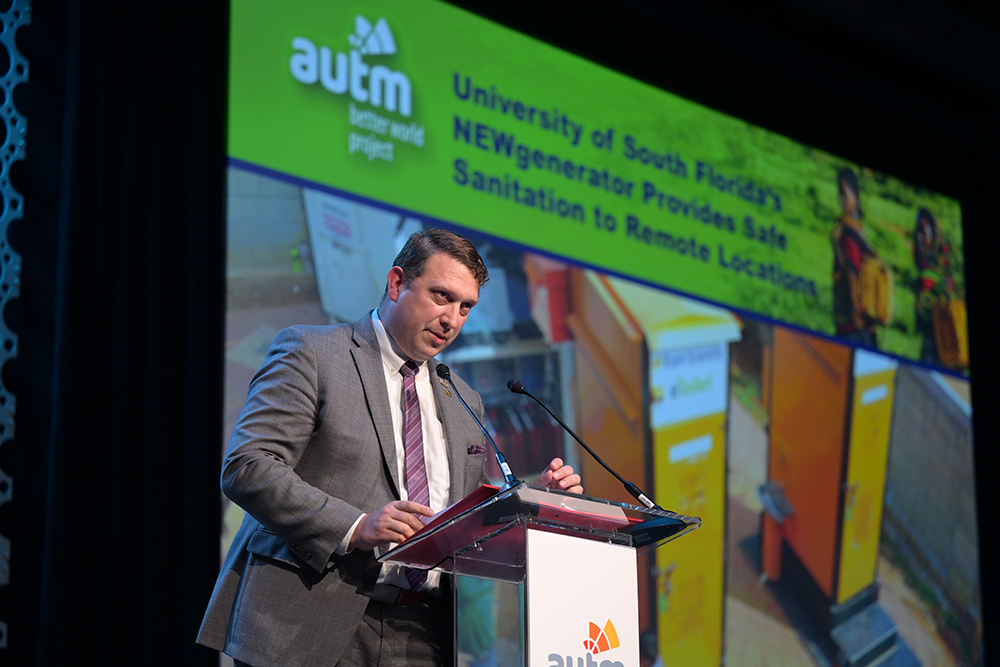AUTM, the national organization of university technology administrators, has named the University of South Florida the recipient of its 2024 Better World Project Award. The USF Office of Technology Transfer worked with inventor and professor in the Department of Civil and Environmental Engineering Daniel Yeh and his team to secure intellectual property protection for NEWgenerator. This solar-powered innovation provides off-grid sanitation to people in remote areas, safely recovering nutrients, energy and water from human waste. The award was announced on the final day of AUTM's 2024 Annual Meeting in San Diego, California.
Hundreds of South African primary school students live in remote areas without access to clean water and sanitation. They rely heavily on dangerous pit and chemical toilets, especially in areas where water is scarce.
Now, these students and others have a new option for safe hygiene. It is his NEWgenerator designed and developed by Dr. Daniel Yeh and his team at USF. This solar-powered innovation provides off-grid sanitation, safely producing nutrients, energy and water from human waste.
NEWgenerator's unique technology differs from typical wastewater treatment because it uses microorganisms to break down waste and recover what would otherwise be thrown away. By-products such as nitrogen and phosphorus can be harvested as fertilizer, and the clean water can be used for irrigation and other uses.
USF's invention requires little energy to use and produces an energy source in the form of methane gas. The entire process has a net positive energy value. This means that it produces more energy than it consumes. This innovative technology is designed to be self-sustaining and operate completely off-grid, reducing strain on wastewater infrastructure and helping solve water and sanitation problems around the world.
Recognizing the potential impact of this breakthrough technology, the USF Technology Transfer Office (TTO) worked with inventors, attorneys, and universities to ensure intellectual property protection. To ensure this technology reaches those who need it most, the TTO team negotiated non-exclusive license agreements with foreign companies and partnered with organizations such as the Bill & Melinda Gates Foundation.
After successfully testing an electronic toilet in India in 2016, Yeh and his team installed a NEW generator in Durban, South Africa, as part of a $1.14 million grant from the Gates Foundation's Reinventing the Toilet Program. did. The new generators were connected to toilet facilities such as toilets, showers and sinks, reusing water to flush toilets and reducing water demand. It also captured nutrients that could be used as fertilizer to support local community farms, creating a potential food source.
“As an engineer and an educator, I am happy to be in a position to see our team's inventions directly improve the lives of schoolchildren,” said Yeh.
Yeh and his team are also consulting with disadvantaged communities across the country to bring safe sanitation to harsh rural environments.
It hasn't been an easy journey for the team, which includes senior development engineer Robert Bair, who has been working on the project since he was an undergraduate at USF.
“It has been an incredible opportunity to work on this technology since its inception. It has taken a lot of time, blood, sweat and tears to get us to this point. Knowing that we were making a positive impact on the lives of people made all that effort worthwhile,” Baer said.
Since entering mass production, the NEWgenerator has been modified to reduce costs, utilize locally made materials, and tailored to local customer requirements.
NEWgenerator won the top award from the Cade Museum in 2014. Other funding awards received include the USF Bull Ring Accelerator Grant (BRAG), the NSF I-Corps Team, and the Florida High Tech Corridor. Yeh's team was also recognized by his USPTO, winning the 2020 Humanity Patent Award.

